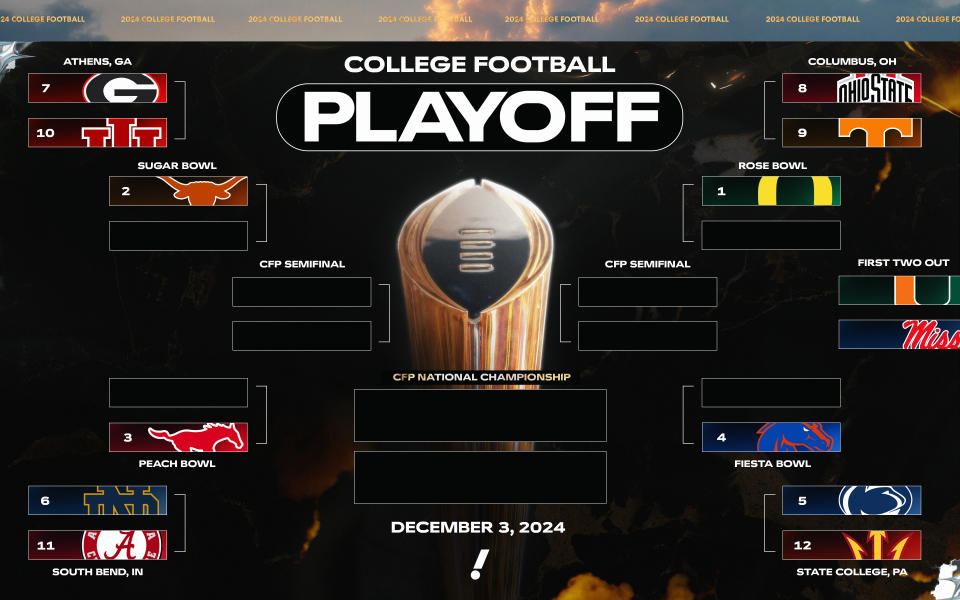We know it’s going to happen soon enough. The 12-team playoff will expand to 14 or 16 schools, and probably 24 or 32 after that.
It’s happened before. Prior to 2000, college football fans just accepted that there could be multiple national champions, as unthinkable as that is now. Anyone older than a current college student remembers the two-team BCS, which begat the four-team CFP, which in turn led to our current 12-team version.
On its face, expansion just makes sense. More playoff schools mean more interest in the playoffs, which in turn means more broadcast, ticket and donor revenue all the way around. What’s not to love? We’re having so much fun at 12, why not invite a few more schools to the party?
Friends, I submit to you that at some point, more is absolutely not better — everybody taps out of an all-you-can-eat buffet at some point — and we are at that point with college football. Twelve teams is the perfect number for the playoff, and with just one more tweak, this will be a perfect format.
I know, I’m as surprised at this turn of events as you are. Let’s dig in.
This glorious, ridiculous sport has a way of hurling itself out a third-story window and landing on a thick bed of cotton candy and gumdrops. At exactly the moment that the playoff expanded to 12 schools, the combination of NIL payments and transfer-portal lures redistributed talent around the country in a way that destabilizes the dominance of the Alabama-Ohio State-Georgia oligarchy, strengthens the roster of the Oregon-Texas-Penn State behemoths, and bolsters the hopes of Tennessee-SMU-Indiana rankings newcomers.
In other words, the number of schools that could conceivably compete for a national championship has grown to somewhere between 12 and 15 … which makes for exactly the kind of drama you want for the final days of the regular season.
You can judge the validity of a playoff system by who it lets in, and who it leaves out. Consider, first, the top end of the rankings. The BCS showed its limitations in 2004, when an undefeated Auburn was blocked from the championship game by BCS computers. UCF went undefeated in 2017, yet didn’t even get a glance from the four-team CFP committee. And it’s a miracle the four-team version survived for 10 years before a Power Five debacle like last year’s Florida State nightmare bubbled up.
No possibility for such catastrophic flaws exists in the 12-team format. If you go undefeated at the FBS level, and you’re playing a semblance of a competitive schedule, you’re in. It’s basically guaranteed. Losses can be mildly damaging (if you’re Alabama) or utterly devastating (if you’re Miami or any Group of Five school), but the pathway to a national title is there for everyone who posts a perfect season, and that’s how it should be.


Now, consider the lower end of the rankings. The worst sin a playoff format can commit is admitting too many members who don’t have any chance of winning even a game. But as Miami, Ole Miss and South Carolina fans can attest, there are plenty of schools on the outside who could — indeed, already have — knock off teams in the playoff bracket. That’s what you want, the perfect balance of opportunity for talented teams and penalty for failing to play your best game, every week.
Plus, let’s be honest here: College football isn’t just about what happens on the field. There’s an inherent uncertainty to a sport where every team logistically can’t play every other one. If you want statistical validity, look to baseball’s 162 games; if you want straight-track certainty, look to the NFL’s deliberately narrow field.
The debate over worthiness is part of college football’s DNA, animating tailgates and message boards and sports talk radio and text threads. As fans of the game, we need that, whether we want to admit it or not. This time around, the team whose merits we’re debating is Alabama; last year it was … uh … Alabama. And next year it’ll probably be Alabama, too. (OK, this part probably needs to change.)
There’s another structural benefit to the 12-team playoff: the opening-round bye. If we’re going to keep conference championships — and that’s a whole different debate — then the schools that win those titles deserve an extra week off. It’s a tangible reward for a season of success … or, in the potential case of Clemson, a case of losing three games in the right conference.
And here is where I’d offer the one tweak to the existing CFP system. Those teams that win their conference championship deserve a home game of their own, not just the 5-to-8 seeds. If you survive the meat grinder of the regular season and go on to win your conference title game, you ought to get the benefit of making your opponents come visit you in Eugene or Athens or College Station in the quarterfinals. (And the benefit of not forcing your fans to travel, too.) Yes, an NFL stadium is a climate-controlled convenience. But college football was born out of maniacal conditions, and a December game in Columbus or Knoxville or State College would be an environment you simply can’t replicate in a MegaDome.
Alas, once the Powers That Be get a taste of how much money this playoff will bring in (hint: A whole lot), they’ll look to expand it, regardless of how expansion benefits the sport itself. And that’ll be a shame, because it’ll rob the regular season of still more drama. So enjoy the tension inherent in every one of the 11 games of this playoff, for as long as we have it.
Oh, and as for you Miami, Ole Miss and South Carolina fans — we understand why y’all would want a retroactive expansion. But next year will be your year, guaranteed.

